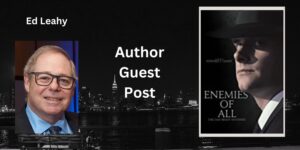You work in multiple genres, how do you decide what “kind” of story you’re writing? (play, novel, short story, etc.) Does the story determine the genre? or do you decide to write in a certain format, then find a story?
I’d say that usually both the story dictates the genre and the genre dictates the story. I’m a little hyper-aware of the typical conventions and structure of both theater and fiction, and pushing back on those conventions, or expanding them, or defying them, influences my concept of the story. In that way, the genre is all wrapped up in my original take on the story.
At the same time my first germ of an idea for a story tends to lead me directly to a genre, whether short or long theater or short or long fiction or short fiction-ish prose. For me the words are always important, but I do tend to think more in images and of course dialogue when I’m in theater mode. I also tend to go in genre spurts; when working in theater I have more theater ideas, and when working on fiction I have more fiction ideas. To further muddle the answer, I’ve written works that are hybrids of genres (theater/prose) and works I’ve crossed over from one genre to another and works that are somewhere in between genres (long short story / short novel, flash fiction / prose). In those cases maybe I didn’t decide.
Tell us about the process for your novel, Affair:
I wrote the first draft of Affair in 2009. The genesis of the story came from the merging of two ideas: the implications of an author writing about an affair, and a quote from Kierkegaard about an author writing about a character going insane but instead going insane himself. The novel went through various edits over the next few years, though the structure and essential “story” remained unchanged. I mostly edited the prose. I sent it out in the typical way to medium and small publishers and contests; I received a few complimentary replies, but nobody picked it up.
When The Seattle Star began publishing online in 2012, the publisher expressed interest in carrying some of my writing and I pitched them on a few chunks of Affair. This evolved into a serialization. We eventually found a rhythm and the novel was serialized over the course of about two years. Throughout the process I continued to edit each piece before I sent it off. When the serialization was complete, The Seattle Star released a free epub ebook version of the serialization under a Creative Commons license. Which was awesome of them. I took that and rereleased ebook versions through Smashwords, which distributes to Apple and Barnes and Noble and others in multiple formats, and Amazon with a few changes, taking it back to the unserialized format.
I then published the print version through CreateSpace, which distributes to Amazon and other online retailers, using the Seattle Star’s great cover. All of the versions are under a Creative Commons license. As for PR, I’m still working on it. All of this publishing happened in a rush this spring before I disappeared (am disappearing?) to the mountains for the summer. I’ve used Facebook some to reach people who know me; I got myself going on Goodreads; a few local bookstores have agreed to carry the book; I’ve contacted a few local periodicals, online and in print, about reviews and publicity; I’ve done a few readings. Publicity is still a work in progress, and not my favorite endeavor, though I do intend to extend my reach this fall.
How does environment impact you as a writer? Are you a “Northwest” writer?
I’m not sure. Certainly my theater pieces are not recognizable as New York-ish, urban, or living room pieces. Most of them are set outside (sometimes in the mountains) or in some nonspace or surreal (but not dream) space. Western motifs show up in many of my writings (horses, cowboys, mountains, wildlife, rivers and large bodies of water). And solitude, or escape, or “getting out,” has always been prevalent too.
The outdoors and working outside and nature are important to me, personally, and my writings are extensions of me, so they are somehow central to the work. I don’t know whether or not to categorize myself (I’m not one for categorization) as a Pacific Northwest or Western writer. I’m a transplant to both locations, though I’ve lived in one or the other for most of my adult life. I wouldn’t say that either the Pacific Northwest or the West is my subject matter, but the backgrounds on which my stories play. Or they provide the materials with which I play, or bend, or tell a story. All that said, I do have a few stories that are very Western in nature. And I’ve come to appreciate the value in local literary/writing communities, in being involved with them, the support and contact one can find there. In that way I do identify myself as a Tacoma/Seattle writer, since those are the communities I’m most connected with.
Check back July 15 for Part II


